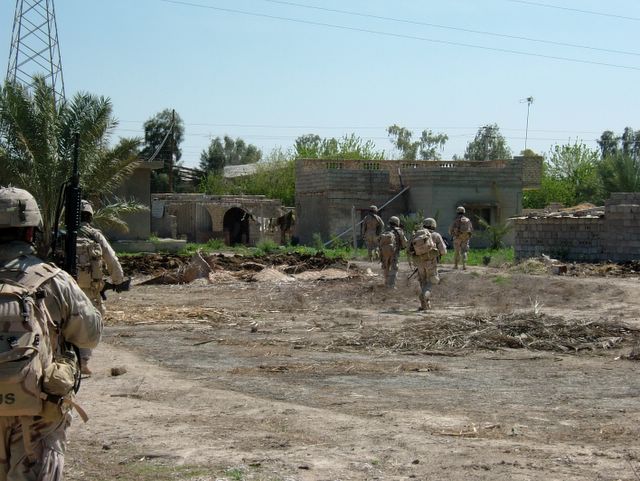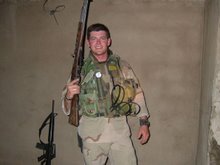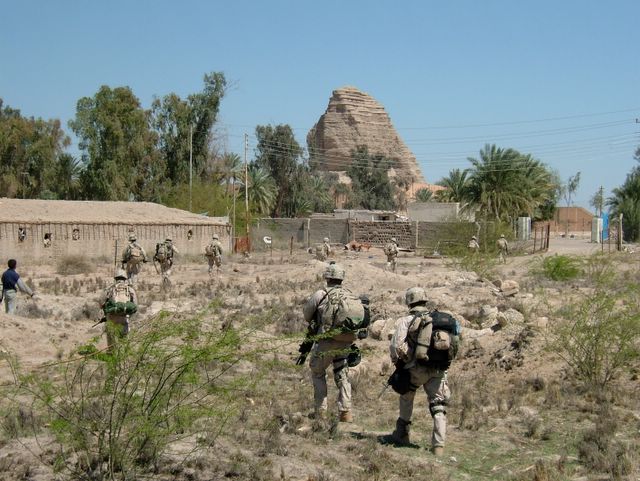U.S. Forces Crack Down on Terrorists Smuggling Bombs From Iran
Tuesday , June 26, 2007
Associated Press
JISR DIYALA, Iraq —
Newly arrived U.S. troops southeast of Baghdad are destroying boats on the Tigris River and targeting networks bringing powerful roadside bombs from Iran as the military cracks down on Sunni and Shiite extremists from all directions.
But a top U.S. commander warned on Monday that three or four times more Iraqi security forces are needed to sustain the progress in clearing the area and stanching the flow of arms and makeshift bombs into the capital.
Maj. Gen. Rick Lynch, whose command covers the southern rim of Baghdad and mostly Shiite areas to the south, said the reinforcements who arrived as part of a troop buildup have had success in rooting out militants from their sanctuaries and preventing them from fleeing the area in an operation called Marne Torch — one of a quartet of offensives in the capital and surrounding areas.
• Visit FOXNews.com's Iraq Center for more in-depth coverage.
"All along the Tigris River valley, people knew this is where the Sunni extremists were storing munitions, training for operations, building IEDs to take them into Baghdad," he said, referring to improvised explosive devices, the term the military uses for roadside bombs.
"They just didn't have the reach to get down there. Now with the surge brigades they've got the reach. But the issue is we can't stay here forever and there's gotta be a persistent presence and that's gotta be Iraqi security forces. And that's always our biggest concern," he said while visiting troops from the 3rd Infantry Division's 3rd Brigade Combat Team at a U.S. patrol base on the southeastern edge of Baghdad.
The dusty base is nestled between high sand berms on what was the Tuwaitha nuclear complex, which was bombed during the U.S.-led invasion and subsequently looted, near the mainly Shiite village of Jasr Diyala, 12 miles southeast of Baghdad.
Lynch said his units had been successful in preventing the militants from fleeing the area ahead of the offensive and overall detained 150 people, including at least 30 high-value targets — most from the rural Arab Jubour area just south of the capital.
"In the past they had exit routes so they saw the operation coming," he said. "What we did is establish blocking positions all around Arab Jubour so the enemy couldn't leave but they had to stay and fight and as a result to either die or be captured."
Lynch's comments were the latest to signal a growing impatience among U.S. commanders with Iraqi security forces amid calls in the U.S. for the Bush administration to start bringing troops home. The Americans have expressed confidence in a new strategy aimed at flooding volatile areas with U.S. troops to quell the violence, but also concern that the progress could be reversed once U.S. troops leave.
Underscoring the dangers, Lynch said two helicopters adjacent to his came under "significant small-arms" fire while flying low over the desert landscape to the patrol base, causing no injuries but leaving one aircraft severely damaged.
The brigade commander, Col. Wayne W. Grigsby, Jr., said 21 boats had been destroyed on the river and in the reeds on the banks since the operation began in force on June 15, most with secondary blasts indicating many were filled with explosive material.
He also said the military had gained intelligence from a local sheik about networks bringing armor-penetrating explosively formed projectiles, known as EFPs, on a major road that travels from the border with Iran through Shiite areas to Baghdad.
Lynch said the area had two battalions from the 8th Iraqi army division but added "there needs to be three or four times more Iraqi security forces than are currently present to provide for sustained security. That's the critical piece in all of this."
Lynch said the Iraqi soldiers with whom he had worked were professional, although many still lacked training and equipment more than four years after the war started in March 2003. He said the main problem was with Iraqi police, a predominantly Shiite force that has been accused of being infiltrated by militias.
"In my battlespace my concern is police, local police. Either they're nonexistent or the ones that are there tend to be corrupt," he said.
"Then there are large portions of the battlespace where there are no Iraqi security forces at all. And the Iraqi security forces have to be grown to a level where they can occupy these places. This is an enemy sanctuary because nobody's been out there. There are no Iraqi security forces so the enemy fills the void."
He said the extra U.S. troops had provided the numbers to curb the militant activity, which included storing munitions, training and building roadside bombs.
"But if someone doesn't secure that presence, I mean have sustained security then it's not going to work. that's the concern," he said.












